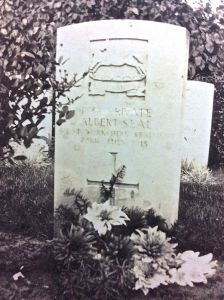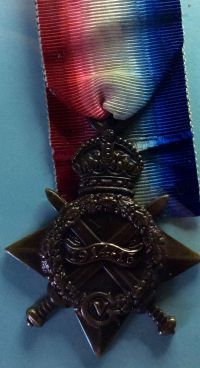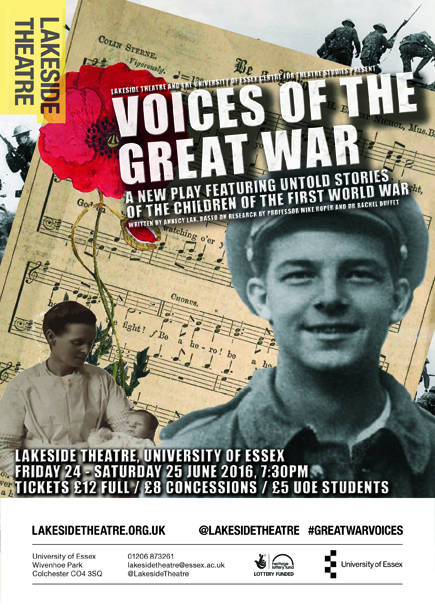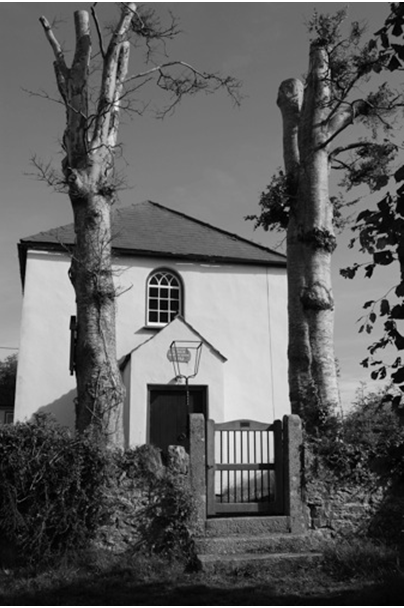This article has been researched and written by Meredith Andrea, who is the grandniece of a World War 1 boy soldier
Clements Hall Local History Group https://clementshallhistorygroup.wordpress.com is harnessing the interests of people living locally to take part in an exploration of the impact and legacy of WW1, funded by the Heritage Lottery Fund. One of the themes of this project is the influence of religion.
When war was declared in August 1914 the British armed forces depended entirely on volunteers to rapidly expand their capabilities. The first months of the conflict were a period of intense propaganda, in which some churches zealously embraced the role of recruiters within their communities.
This was the case in South Bank, where the Rev. Stanley Parker of Southlands Wesleyan Methodist Chapel preached energetically on the righteousness of war. Examining The Southlands Messenger of the period, part of an archive held at the Borthwick Institute at the University of York, Meredith Andrea investigates the Chapel’s attitude to enlistment, linking it to the case of a local boy soldier, her great-uncle Albert Seal.
On August 5th 1914, the day after Britain declared war on Germany, Field Marshall Lord Kitchener accepted the post of Secretary of State for War, and set out to raise a fighting force sufficient for the protracted conflict he predicted. He first appealed for volunteers on August 7th.
Between August 1914 and December 1915, 2,466,719 men joined the British Army voluntarily. But this was soon deemed insufficient, leading to the Derby Scheme in the autumn of 1915, and, following its inadequate results, the introduction of conscription for single men of military age (18 – 40 years) with the first Military Service Act of 27 January 1916.
That initial period of purely voluntary enlistment – August 1914-September 1915 – is one in which local church leaders and religious groups may have expressed their own attitudes to war most forcefully.
During the same period, however, early casualties were beginning to impact on communities, and churches and their leaders had to find a way of responding to this difficult news.
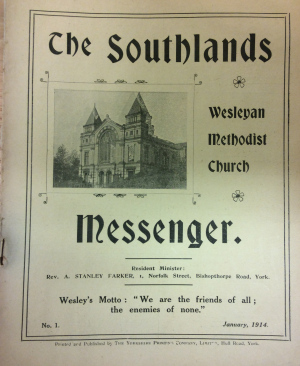
Southlands Messenger, reproduced with permission from originals in the Borthwick Institute, University of York, MR Y/SOU 38/3
The Southlands Messenger, monthly magazine of Southlands Wesleyan Methodist Chapel in York, covers this period (it ceased publication in December 1915). Now held in the Borthwick Institute archives at the University of York, the Messenger, published monthly and edited by Southlands Pastor the Rev. Stanley Parker, is an outstanding historical resource, providing a unique insight into the life of the Chapel and the local community.
Almost a complete run, it adds up to a narrative of the first year of war, including reports of sermons, records of church activities, news of the establishment of a soldiers’ rest room with musical entertainments, and ‘Jottings about Southlands Lads in Khaki’.
These items are framed by advertisements for newsagents, boot-makers, suppliers of surgical appliances, and ‘Navy Blue Yorkshire Serges guaranteed not to spot or cockle with the rain’, most if not all of which were placed by businessmen among the Southlands congregation. Rev. Parker advertised his public preaching engagements in York, and in May 1915 announced the publication of his collection of sermons for children on the back page.
In the early months of the war the dominant voice in The Southlands Messenger is Rev. Parker’s own. Fervently convinced of the righteousness as well as the inevitability of going to war, he declared himself on September 16th 1914 ‘Ready to Join the Fighting Ranks’, in a sermon that was also reported with extensive quotes in the next day’s Yorkshire Herald.
‘It was a war of nationality against imperialism; of industrialism against militarism; of civilization against barbarism; of liberty against despotism’ he told an unusually large audience, which included the Sheriff of York, Newbold Kay.
And ‘certain compensations’ could be expected:
‘The British Nation had been losing its seriousness. Picture halls, disgusting prize-fights at which ladies were present, sport, and pleasure-seeking had hidden the deeper things. The Sabbath was neglected. God was exiled from the lives of multitudes. There had been a partial paralysis of national conscience. Now a spirit of seriousness possessed the nation. Men had remembered God.’
Several Sundays later, in October 1914, he expanded on this theme, preaching on ‘the war as a national purifier’:
‘Germany’s people had been led astray by the false teaching of Nietzsche and his horrible doctrine of the superman. Germany, by these war fires, must be purged from this fatal philosophy. France was largely atheistic, and there and in Belgium he (the preacher) had seen such moral evils that he shuddered. Might those atheisms and immoralities be burned up in the furnace. Russia too was a land where freedom was rare. He hoped the war fires would burn up all the people’s bonds and set them free. England, too, had much dross to be refined away…’
The use of the third person rather than simple quotation in the Messenger’s reports of its own Editor’s sermons has a curious effect, both distancing and amplifying his voice. His thoughts seem to be transmitted to the reader via an acolyte or disciple – their wisdom implicitly endorsed.
In November 1914 Rev. Parker preached sermons entitled ‘On the Certainty of German Defeat’ and ‘Belgium Will Rise Again’. February 1915 found him preaching against ‘sloth’, ‘indifference’, heathenism’ and ‘idolatory’, summarized under the title ‘Lions to be Slain in York’. By the spring of 1915, however, he reports that he is unwell, and over the summer he contributes essays rather than sermons, which do not relate directly to the war – ‘Prayer: Its Problems, Conditions and Power’, ‘On Paul’s Speech at Athens’ and ‘Christ’s Attractiveness’.
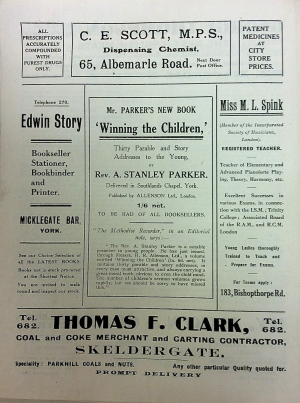
Southlands Messenger, reproduced with permission from originals in the Borthwick Institute, University of York, MR Y/SOU 38/3
In May Winning the Children, a compilation of ‘thirty parable and story addresses to the young’ is advertised in the Messenger. It includes sections entitled ‘Hero or Coward’, ‘Christ on the Battlefield’, and ‘Brave Heart’. The Methodist Recorder endorses it with the comment that ‘the Rev. A. Stanly Parker is a notable preacher to young people’.
By August 1915 Rev. Parker returned to the topic of war, with a sermon on ‘The Dignity of Sorrow’:
‘those who had given loved ones had the consolation of knowing that their lives had been given not in some mad adventure after gold, but for the safety of Europe and the liberty of the world. He was very much struck by the dignity of sorrow which everywhere characterized the people. That sorrow was deep. But it was a proud sorrow with rejoicing in its heart’.
Since October 1914 Southlands Messenger had printed a ‘Roll of Honour’ – naming those associated with the chapel who had enlisted – which always ended with the words ‘Mr. Parker will be pleased to receive the names of any others who may enlist’. In September 1915 it was followed for the first time by a notice ‘In Memoriam’. It named Fred Long, Edward Long, and Albert Seal, all of the 5th West Yorkshire Regiment; Wilfred Fewster of the 10th Hussars; and John Henry Taylor of the Royal Engineers.
That same month the results of the Derby Scheme became known and conscription became an inevitability.
And Rev. Parker, whose work in York was done after three years as Pastor of Southlands, moved on to Oldham Street Church in Manchester. The preaching style of his successor, Rev. Freeman, is harder to discover, as The Southlands Messenger ceased publication in December 1915. It stated that this was due to the difficulty of raising advertising revenue as local businesses were forced to make economies.
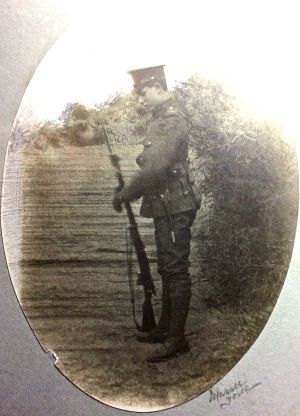
Albert Seal
This is the only image the family possess of Albert in uniform. It has not been formally posed, and examination shows it has been collaged by the photographic studio, Massons, as there is drawing in the landscape in which he appears to be standing. This is most likely to have been done after his death, using a photo taken during army training.
Albert Seal
Albert Seal, one of those listed ‘In Memoriam’, was born on 28th June 1898, the youngest by five years in a family of eight siblings. His mother, Hannah, died shortly after his birth; and he grew up in the care of his two sisters, Edith and May. His father, Stephen Seal, aged sixty-three in 1914, was a train driver. Three of Albert’s brothers, Stephen, Edwin and Herbert worked on the railway in different capacities; and Albert was employed as a clerk in the Secretary’s Office of the NER. The Seals are associated with three addresses in Southbank: 4 Osborne Terrace (now Upper Price Street) at the 1901 census; 50 Nunmill Street, just a few doors away from Southlands Chapel, at the 1911 census; and by 1914 – and for the next eleven years – 8 Beresford Terrace.
Southlands Wesleyan Methodist Chapel, completed in 1887, had fifteen purpose built schoolrooms. Albert attended its Sunday School, and by 1914 was in an Intermediate class, from which eight men and boys had enlisted by December 1915. A regular column in The Southlands Messenger, ‘Jottings About Southlands Lads in Khaki’ which later in the year becomes more soberly ‘Our Men in Khaki’, gives news of the men from conversations when home on leave and letters sent to chapel members, detailing their movements, injuries, and deaths. These reports do not spare details of what the boys and men were going through, and hint at mental suffering in that their unwillingness to talk in detail about life at the front is remarked on. The columns radiate affection, concern and a strong sense of a community. They are written by Mr. W.H. Hodson, who owned a tailor’s business at 113 Nunnery Lane and besides editing ‘Church Notes’ regularly advertised in the Messenger.
As Albert Seal’s grandniece, I grew up with the story of how he had enlisted in September 1914, aged sixteen, without his family’s knowledge; how great-grandfather had petitioned to have him sent home as he had not reached the official recruitment age of eighteen, and how he died from a gunshot wound to the head before he could be persuaded to return, in the month after his seventeenth birthday.
His friend John Jackson, of 15 Brunswick Street, with whom he joined the 5th West Yorkshire Regiment, was also sixteen, and a member of Southlands Intermediate Sunday School class. John survived the conflict.
While the commonly accepted definition of a child soldier has differed across cultures, Albert’s father took the view that his was the action of raw youth under the influence of peer pressure. According to John’s grand-daughter, Liz Moran, his mother also felt her son was too young to be sent to the front. Like Stephen Seal, she visited the recruiting office to protest, and followed this up with many letters asking that her son be sent home.
In contrast to the boys’ parents the Southlands Messenger neglects any consideration of their ages, listing them in its ‘Roll of Honour’ continuously, month on month, from October 1914 – and always with the message ‘Mr. Parker will be pleased to receive the names of any others who may enlist’. And so they were doubly recruited; by the Army, and as fine examples of ‘Heroes not Cowards’ (to adapt the title of one of the chapters in Rev. Parker’s Winning the Children – ‘Hero or coward?’).
It is barely conceivable that Albert’s age was unknown, either to the Chapel, or in the locality. Indeed, the notice of his death in the Messenger comments, after an account of his last hours and burial, ‘Albert was just seventeen, and is the first of what I may term our present lads to fall…Our prayers and sympathy go out to his father and his sisters.’
Examination of The Southlands Messenger shows that in the autumn and winter of 1914 the Chapel, under Stanley Parker’s leadership, was zealous in its support for war, urging its ‘lads’ to enlist, advertising that they had done so, and apparently turning a blind eye to whether or not they were under-age. Once they had enlisted, its remorseless propaganda as well as its proprietorial, if affectionate commitment to its ‘Lads in Khaki’ would make it very difficult for anyone in Albert Seal and John Jackson’s position to accept the return home their parents had petitioned for, even if the Army had sanctioned it.
The Messenger’s extension of prayers and sympathy to Albert’s father and sisters (though not, interestingly, his brothers) appears heartfelt. However, if it seems to imply they would share the response to his soldier’s death ascribed by Rev. Parker to the bereaved (‘a proud sorrow with rejoicing in its heart’) I believe this is extremely unlikely to have been the case. The terms in which the Seal family mourned their youngest would, I imagine, have been quite different.
Acknowledgements
All images from the Southlands Messenger are reproduced with permission from originals in the Borthwick Institute, University of York, MR Y/SOU 38/3. I am extremely grateful to Liz Moran for supplying information about her grandfather John Jackson, and our great-grandparents’ attempts to get their under-age sons home from the Front.



